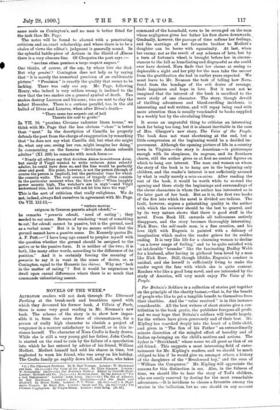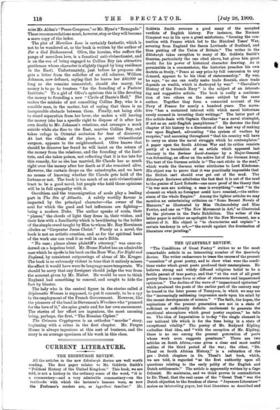NOVELS OF THE WEEK.*
Avrnotrear readers will not dash through The Uttermost Farthing at the break-neck and breathless speed with which they devoured his former book, A Villain of Parts, there is some very good reading in Mr. Neuman's new book. The scheme of the story is to show how impos- sible it is, from the mere force of circumstances, for a person of really high character to cherish a project of vengeance in a manner satisfactory to himself, or in this in- stance herself. The character of Nora Crofts is finely drawn. While she is still a very young girl her father, John Crofts, is started on the road to ruin by the failure of a speculation into which he has entered by advice of his friend, William Medlett. Medlett himself had sold his shares in time, but neglected to warn his friend, who was away on his holiday. The Crofts family go rapidly down hill, and Nora, who takes • (1.) The Uttermost Farthing. By B. Paul Neuman. London : W. Blackwood and Sons. [es.]—(2.) The Voice of the People. By Ellen Glasgow. London : W. Heinemann. [68.1—(3.) For Britain's Soldiers. Edited by CutclIffe Hyne. London : Methuen and Co. Ees.]—(4.) Merciless Lore. By the Author of" For a God Dlidamonred." London : John Long. [6s.)--(5.) The Sin of Atlantis. By Roy Hornlman. London : John 31acqueen.—(6.) For Right and Engktiut. By Hume Nisbet. London : F. V. White. [as. 6d.]—(7.) A Diplo- matic Woman. By II thin Mee. London: Sands and Co. (3s. 6d.)—(8.) The Crimson Cryptogram. By Fergus Hume. London: John Long. Os. ild.]
command of the household, vows to be revenged on the man whose negligence gives her father his first shove downwards. Gradually, however, the passage of time softens her feelings, and the marriage of her favourite brother to Medlett's daughter can be borne with equanimity. At last, when her enemy, not as the result of any schemes of hers, but by a turn of fortune's wheel, is brought before her in circum- stances to the full as humiliating and disgraceful as she could ever have desired, Nora finds that her shame at seeing so deplorable a• sight and her pity for the man take the savour from the gratification she had in earlier years expected. • We must leave to Mr. Neuman the task of telling how Nora, freed from the bondage of the evil desire of revenge, finds happiness and hope in love. But it must not be imagined that the interest of the book is sacrificed to the mere study of one character. The story, though devoid of thrilling adventures and blood-curdling incidents, is interesting and well written, and will repay being read with more attention than is usually vouchsafed to books supplied in a weekly box by the circulating library.
It seems an ungrateful thing to criticise an interesting book for being too long, but it is almost inevitable in the case of Mrs. Glasgow's new story, The Voice of the People. The book does not want shortening at the end, but a little compression at the beginning would be a decided im- provement. Although the opening picture of life in a country town in Virginia—the story is American—is picturesque enough with its sleepiness, its negroes, and its Southern charm, still the author gives us at first no central figures on which to hang our interest. The man and woman on whom the story of the book is to hang are in the beginning only children, and the reader's interest is not sufficiently aroused by what is really merely a mise-en-seene. After reading the rest of the book, it would be worth while to re-read the opening and there study the beginnings and surroundings of the clever characters in whom the author has interested us in the later part of her book. But as it is, the first two books of the five into which the novel is divided are tedious. The fault, however, argues a painstaking quality in the author with which the reviewer should be the last to quarrel, and by its very nature shows that there is good stuff in the novel. From Book III. onwards all tediousness entirely disappears, and the story• becomes thoroughly interesting. Nick Burr, the self-made man, is a fine creation, and his love idyll with Eugenia is painted with a delicacy of imagination which makes the reader grieve for its sudden ending. It is very like life for a charming woman to decline "on a lower range of feeling," and to be quite satisfied with an intolerable " bounder " like the fascinating Dudley Webb for a husband, after having in girlhood been loved by a man like Nick Burr. Still, though lifelike, Eugenia's conduct is unide,al, and she herself is sufficiently living to make the reader regret the fate with which she is quite content. Readers who like a good long novel, and are interested by the study of America, will very much enjoy The Voice of the People.
For Britain's Soldiers is a collection of stories put together on the principle of the charity bazaar,—that is, for the benefit of people who like to get a tangible benefit to themselves from their charities. And the "value received" is in this instance considerable. All the best writers of short stories give a con- tribution to the book gratis, the publisher foregoes all profit, and we may hope that Britain's soldiers will benefit largely, for the writers have given generously and of their best. Mr. Kipling has searched deeply into the heart of a little child, and given in "The Son of his Father" an extraordinarily minute dissection of the mingled effect of heredity and of Indian up-bringing on the child's motives and actions. The father is "Strickland," whose name we all greet as that of an old friend. This suggests a moot interesting field of enter- tainment for Mr. Kipling's readers, and we should be much obliged to him if he would give us, amongst others, a history of the daughters of the "Brushwood boy," and the sons of "William the Conqueror." Mr. Kipling will appreciate the reasons for this distinction in sex. Also, in the fulness of time, we should like to hear the story of Tod's children, who are surely reserved by destiny for the most remarkable adventures.—It is invidious to choose a favourite among the stories in the -Collection, but no' one should On any account
miss Mr. Alden's "Peace Congress," or Mr. Hyne's "Renegade." These recommendations must, however, stop or they will become a mere copy of the index.
The plot of Merciless Love is certainly fantastic, which is not to be wondered at, as the book is written by the author of For a God Dishonoured. Olive, the heroine, who suffers the pangs of merciless love, is a fanatical anti-vivisectionist, and is on the eve of being engaged to Collins Bey (an attractive gentleman whose character is slightly tinged by long residence in the East). Unfortunately, just before he proposes she gets a letter from the solicitor of an old admirer, William Johnson, now defunct, saying that he leaves her 240,000 as long as she remains unmarried; should she marry, the money is to go to trustees "for the founding of a Pasteur Institute." To a girl of Olive's opinions this is like devoting the money to founding a new "Circle of Dante's Hell," She makes the mistake of not consulting Collins Bey, who is a sensible man, in the matter, but of saying that there is an insuperable obstacle between them. Finally, not being able to stand separation from her lover, she makes a will leaving the money (she has a specific right to dispose of it after her own death) to Mr. Johnson's relations, and arranges a mock suicide while she flies to the East, marries Collins Bey, and takes refuge in Oriental seclusion for fear of discovery. At last the villain of the piece, a great vivisectionist surgeon, appears in the neighbourhood. Olive knows that should he discover her fraud he will insist on the return of the money from the relations, and the founding of the Insti- tute, and she takes poison, not reflecting that it is too late for this remedy, for as she has married, Sir Claude has as much right over the money after her death as if she remained alive. However, the curtain drops on the catastrophe, and we have no means of knowing whether Sir Claude gets hold of the fortune or not. The book is too much of an anti-vivisectionist tract to be a good novel, but people who hold those opinions will be in full sympathy with it.
Occultism and the transmigration of souls play a leading part in The Sin of Atlantis. A subtly worldly flavour is imparted by the principal character—the owner of the soul for which the good and bad influences are fighting— being a modern Duke. The author speaks of souls, their "planes," the clouds of light they dress in, their wishes, and their fate with a familiarity which is bewildering to the holder of the simple creed taught by Him to whom Mr. Roy Horniman alludes as "Carpenter Jesus Christ." Purely as a novel, the book is not an artistic creation, and as for the spiritual basis of the work one can read it as well in one's Bible.
"No case; please abuse plaintiff's attorney," was once en- dorsed on a hopeless brief. Mr. Hume Nisbet has an admirable ease which he spoils in his book on the Boer War, For Right and England, by consistent outpourings of abuse of Mr. Kruger. The book is so extremely violent in tone that it entirely misses the effect it would have were its language more temperate. We should be sorry that any foreigner should judge the war from the account given by Mr. Nisbet. He would be sure to think England had something to conceal, and sought to hide the fact by bluster.
The lady who is the central figure in the stories called A Diplomatic Woman is supposed, to put it coarsely, to be a spy in the employment of the French Government. However, like the pioneers of the band in Stevenson's Wreckers who "pranced for the love of it," she spies gratis and for her own amusement. The stories of her effort are ingenious, the most amusing being, perhaps, the first, "The Russian Cipher."
The Crimson Cryptogram is an orthodox " murder " story, beginning with a crime in the first chapter. Mr. Fergus Hume is always ingenious at this sort of business, and the story is an average specimen of his work in this class.



































 Previous page
Previous page